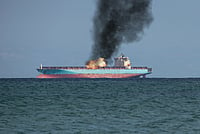‘I’ll tell you what I remember...I have always liked a poem from In Prison. You know the one in which sorrow is compared to an iceberg?
My sorrow: an iceberg,
Its tip alone breaking the waterline.
My memories: drops of acid
That leave me shivering in pain.
On my shoulders, the crucifix of life
On my forehead, the placard of my fate—
You who have washed the guilt off your hands, You who have exfoliated your past,
How do you manage with these new-hewn faces?
‘That poem mirrors my life in more ways than one. Most people see only the tip of the iceberg. And even this causes much discussion in society. My past is like the submerged part of the iceberg. But an iceberg is constantly being fed by the sea. My face seems frozen too.
‘And yet, ever since I’ve become aware of this, oddly, the past has begun to elude me. When I think I’ve got hold of it, my spirit trembles. For a long time, I think I’ve been seduced by surfaces. This shocks me.
‘Then you come along and ask that I should take an axe to the iceberg. Will it break? Or would I reduce myself to the state of a Pothraj? You’ve seen them, haven’t you? Those bare-chested men who whip themselves on the street, who wear anklets on their feet but have rather good biceps, which they pierce with needles till blood spurts...That’s who I’d be, and then people would gather around and clap and sigh and say, “Poor chap.” Do I want to become an object of people’s pity?’
‘How would you be to blame even if you do?’

‘I know. If I’d been born in some frigid tundra, would my past have been different? There too I would have known sorrow. But it would have been a different kind of sorrow, not a result of calculated inhumanity.
‘I cannot tell you if you will meet this “Me” in the story. The reflection of a man in a mirror does not know the whole story of the man it is reflecting. Consider this: My real name is Dagdu; you’ve forgotten that, right? So have I. But that’s the name you’ll see in the school register. No one in the city knows me as Dagdu. Who knows whether even my wife and children know the name. Since my childhood I’ve hated this name. Shakespeare may have said, “What’s in a name?” but tell me, why should this name fall to my lot? It smacks of a clod on which a clod was born. Look at our nicknames— Kachrya, which conjures up dirt; Dhondya, which suggests stones. If by some chance someone were to name his child Gautam, it would be shortened to Gavtya. The Manusmriti has a list of names for Shudras; it requires that our names should reflect society’s contempt for us. Brahmins’ names signify learnedness—“Vidyadhar”, for instance. Kshatriyas’ names suggest valour—like “Balaram”. Vaishyas can be named after the goddess of wealth, say “Laxmikant”. And Shudras? For us, names like Shudrak or Maatang, names that declare our low-caste status. That was the order of things for centuries.’
WHEN I WAS a child, Aai would say, ‘Child, I had ten or fifteen other children whom I stuffed into the earth. My babies just kept dying. I asked for a boon and when you were born someone advised me, “Just name him something like Dagad or Donda. He’ll live.”’ And so I was named. I began to go to school. Since I didn’t like my name, my classmates began to call me DM. If one of them came home and asked for me, Aaji, my grandmother, would stand at the door and say, ‘Dyaam is not at home.’ Dyaam was her version of DM.
My childhood was divided between the village and the city. It would not be wrong to say that I had one foot in the city and one in the fields. Perhaps this is why I am never really at home in either place. Just as Krishna ripped Jarasandha’s body into two and tossed them apart, my life has split my psyche into two.
My father worked at the dry docks in Mumbai. I called him ‘Dada’. My son calls me ‘Dada’ too. I would not like it if he were to address me as ‘Daddy’ or ‘Papa’. It feels like someone calling the humble cactus Opuntia Dillenii...
What was I saying? Yes. My childhood. At that time, we were living at Kawakhana. In a ten-by-twelve-foot room. A tap inside, common toilet outside. Aai, my paternal cousin’s family, and later Aaji, all lived there.
You won’t find Kawakahana on any map of Mumbai. In those days the tram from Khada Parsi turned into Foras Road on its way to Girgaon. Aaji says that she remembers horse-drawn trams. She would tell me her memories. As a child, I would dream of those horses, foaming at the mouth, struggling to get the trams up the bridge. Nagpada props itself up against this bridge and in the middle of Nagpada was Kawakhana. Today, it’s all tall buildings, five or six storeys high. On one end was Chor Bazaar or the thieves’ market. On the other side was Kamathipura, the red-light area. Golpitha was where the prostitutes lived. Kawakhana was squeezed between these two.
The Mahar community lived in little islands in the surrounding areas. All of us came from the Konkan plateau, from Sangamner, Akola, Junnar, Sinnar. And around us, there were communities of Christians and Muslims.
The Mahars lived in squalid homes, each the size of a henhouse, each henhouse having two or three sub-tenants. Wooden boxes acted as partitions. But they were more than that: we stuffed our lives into those boxes. At night, temporary walls would come up, made of rags hanging from ropes.
The Mahar men worked as hamaals or labourers. Some worked in the mills and factories. None of the women observed purdah. How could they? They worked harder than the men. They scavenged scraps of paper, rags, broken glass and iron from the streets, sorted them out and then sold them each morning. And however much their drunkard husbands beat them, they continued to serve them, hand and foot, and indulged their addictions.
Most women gathered discarded paper from the cloth shops of Mangaldas market. They had to bribe the shopkeepers’ servants to be allowed to take this waste paper away. Each woman had a few shops marked out as her territory and border disputes were frequent and noisy. Other women washed the clothes of the ladies in the brothels. Some of the prostitutes, tired of keema pao, would also ask them to cook bajri bhakris and fiery meat dishes. Sometimes, sly customers would ask for these women instead of prostitutes. Then the Mahar women would run for their lives, guarding their fragile honour.
(Excerpted with permission from Speaking Tiger Books)
(Translated by Jerry Pinto)


























